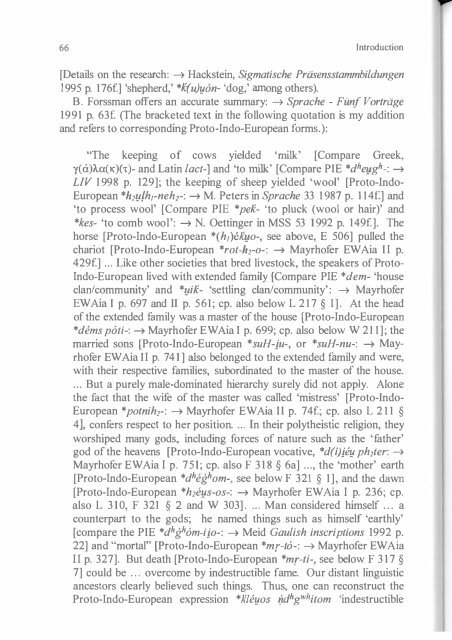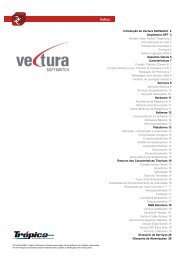You also want an ePaper? Increase the reach of your titles
YUMPU automatically turns print PDFs into web optimized ePapers that Google loves.
66 Introduction[Details on the research: -4 Hackstein, Sigmatische Prtisensstammbildungen1995 p. 176f.] 'shepherd,' *Ii(u)yon- 'dog,' among others).B. Forssman <strong>of</strong>fers an accurate summary: --7 Sprache - Funf Vortrage1991 p. 63f. (The bracketed text in the fo llowing quotation is my additionand refers to corresponding Proto-Indo-European forms.):"The keeping <strong>of</strong> cows yielded 'milk' [Compare Greek,y(a)A.a(K)(t)- and Latin lact-] and 'to milk' [Compare PIE *dhe1}gh-: --7LW 1998 p. 129]; the keeping <strong>of</strong> sheep yielded 'wool' [Proto-IndoEuropean *",1}/h,-neh,-: --7 M. Peters in Sprache 33 1987 p. 114f.] and'to process wool' [Compare PIE *pe/(- 'to pluck (wool or hair)' and*kes- 'to comb wool': --7 N. Oettinger in MSS 53 1992 p. 149f.]. Thehorse [proto-Indo-European *(h,)ej(yo-, see above, E 506] pulled thechariot [proto-lndo-European *rot-II,-o-: --7 Mayrh<strong>of</strong>er EWAia Il p.429f.] ... Like other societies that bred livestock, the speakers <strong>of</strong> Pro toIndo-European lived with extended family [Compare PIE *dem- 'houseclan/community' and *1}i/(- 'settling clan/community': --7 Mayrh<strong>of</strong>erEWAia I p. 697 and Il p. 561; cp. also below L 217 § I]. At the head<strong>of</strong> the extended family was a master <strong>of</strong> the house [proto-Indo-European*dems poti-: --7 Mayrh<strong>of</strong>er EW Aia I p. 699; cp. also below W 211]; themarried sons [proto-Indo-European * suH-ju-, or *suH-nu-: --7 Mayrh<strong>of</strong>erEW Aia II p. 74 1] also belonged to the extended family and were,with their respective families, subordinated to the master <strong>of</strong> the house.... But a purely male-dominated hierarchy surely did not apply. Alonethe fact that the wife <strong>of</strong> the master was called 'mistress' [Proto-IndoEuropean *potnih,-: -4 Mayrh<strong>of</strong>er EW Aia II p. 74f.; cp. also L 211 §4], confers respect to her position . ... In their polytheistic religion, theyworshiped many gods, including fo rces <strong>of</strong> nature such as the 'father'god <strong>of</strong>the heavens [proto-Indo-European vocative, *d(iJjey ph,ter: --7Mayrh<strong>of</strong>er EW Aia I p. 751; cp. also F 318 § 6a] ... , the 'mother' earth[Proto-lndo-European *dheghom-, see below F 321 § 1], and the dawn[Proto-Indo-European *h,eys-os-: --7 Mayrh<strong>of</strong>er EWAia I p. 236; cp.also L 310, F 321 § 2 and W 303] . ... Man considered himself ... acounterpart to the gods; he named things such as himself 'earthly'[compare the PIE *dhghom-ijo-: --7 Meid Gaulish inscriptions 1992 p.22] and "mortal" [proto-lndo-European *mr-to-: --7 Mayrh<strong>of</strong>er EWAiaII p. 327]. But death [proto-Indo-European *mr-ti-, see below F 317 §7] could be ... overcome by indestructible fame. Our distant linguisticancestors clearly believed such things. Thus, one can reconstruct theProto-lndo-European expression */(Jeyos 6dhgwhitom 'indestructibleThe Reconstruction <strong>of</strong>Protcrlndo-European 67fame,' in which *Kleyos actually means the 'heard news' ... In a societycompletely without writing ... fame spreads principally through oralretelling on the part <strong>of</strong> a creative singer and through auditive receptionon the part <strong>of</strong> other people, for example, at a festival <strong>of</strong> the Gods. Ofwhat was the fame <strong>of</strong> men composed, <strong>of</strong> which the singers then ...spoke and sang? Surely, to a large extent <strong>of</strong> men's [Compare PIE*uiH-ro-: --7 Mayrh<strong>of</strong>er EWAia II 569f.] deeds <strong>of</strong> battle. The community<strong>of</strong> speakers <strong>of</strong> Proto-lndo-European declared their support forheroism and thus fundamentally for the subjugation <strong>of</strong> the weak. Peoples<strong>of</strong>Indo-European languages have conquered, in the course <strong>of</strong>tirne,large parts <strong>of</strong> the world ..."4) Following is a small selection <strong>of</strong> literature on individual themesamong those mentioned. - a) On several areas: --7 Buck A Dictionary <strong>of</strong>Selected Synonyms in the Principal Indo-European Languages. 1949;Hehn Cultivated Plants and Domesticated Animals (1885) 1976; Studienzum indogermanischen Wortschatz 1987; Scardigli Weg zur DeutschenSprache 1994 p. 43ff; Gamkrelidze / Ivanov lE and IEs I 1995 p. 377ff.(Part Two: Semantic Dictionary <strong>of</strong> the Proto-Indo-European Languageand Reconstruction <strong>of</strong> the Indo-European Proto-Culture); Mallory / AdarnsEncyclopedia 1997; A. Hausler in RGA 15 2000 under the headingIndogermanische Altertumskunde. - b) Focused on problems concerningthe horse: --7 FS Sehlerath 1992 [1994]; P. Raulwing, "Pferd, Wagen undIndogermanen: Grundlagen, Probleme und Methoden der Streitwagenforschung"in Fachtagung Innsbruck 1996 [1998] p. 523ff.; by the sameauthor, Horses 2000; also by the same author, in DNP 9 2000 under theheading Pfe rd. - c) On the social structure: --7 Benveniste Institutions I +Il 1969; B. Schlerath, "K6nnen wir die urindogermanische Sozialstrukturrekonstruieren?" Methodologische Erwiigungen in Studien zum indogermanischenWortschatz 1987 p. 249-264; S. Zirnmer, "Linguistische Rekonstruktionund Geschichte" in Bopp-Symposium 1992 [1994] p. 302-313. - d) On religion: --7 G. E. Dunke1, "Vater Himmels Gat/in" in Sprache34 1988-1990 [1992] p. 1-26 and Sprache 35 1991-1993 p. I; B.Schlerath, Religion der Indogermanen in Fachtagung Innsbruck 1996[1998] p. 87ff. - e) On poetic language: --7 Schmitt Dichtersprache1967; Indogermanische Dichtersprache 1968; Watkins How to Kill aDragon 1995.E 513. That the various lodo-European languages have developed from aprior unified language is certain (see above, E 435). Questionable is, how-





